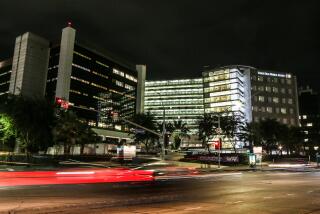Cedars Tests Tots Born in Early ‘80s for AIDS Virus (1987)
Two to five percent of newborns who received blood transfusions at Cedars-Sinai Medical Center between 1980 and 1985 may have been infected with the AIDS virus although none tested so far have developed the deadly disease, the director of a $500,000 federally funded study at the hospital said Thursday.
Dr. Thomas Mundy, the pediatrician who heads the study, emphasized that fewer than 200 of the 700 babies--mostly premature infants--who received transfusions in the five years before a test for tainted blood became available have been located and screened, so the results are preliminary.
Routine screening of the blood supply for AIDS began in the spring of 1985.
Vary Year to Year
“So far, under 5%--maybe it’s even under 2% or 3%--of those screened have tested positive,” said Mundy, adding that the percentages vary by year, probably because the families of children born in 1985 are easier to locate than those born five years earlier.
Mundy, an assistant professor of pediatrics at UCLA and attending physician at Cedars, said planning for the research project began more than a year ago. The first children were screened in February.
He said he is aware of three child deaths from transfusion-related AIDS at Cedars, one of whom received a blood transfusion elsewhere. Those three were known before the study began and are not included in its findings.
Although Cedars, which received a grant from the Centers for Disease Control in Atlanta, is the first hospital in the country to conduct such a study, “the blood here is not any better or worse than anywhere else,” hospital spokesman Ron Wise said. The hospital uses blood donated to its own blood bank as well as blood from the Red Cross.
A Cedars task force is considering whether to extend the screening to adults, but Mundy said the pediatric study is especially important “because not every parent of every baby who got a transfusion knows that the child was given blood and clearly the baby doesn’t know.” The situation may be different with adult patients since they or family members would be more likely to know if they received blood.
Number for Information
For that reason, any parent whose child was treated in Cedars’ neonatal intensive care unit during that period is urged to call (213) 855-4441 to find out whether the child got blood, and if so, to arrange for free, confidential tests and follow-up, including an evaluation of the youngster’s immune system and family counseling when needed.
Cedars hastily called a press conference about the study Thursday to quell fears raised by what it called a “sensationalized” television report earlier this week about a so-called secret study of babies born there.
Actually two other television stations had reported on the study as early as last May, Wise noted.
The study also attracted new attention in the wake of steps taken by several San Francisco-area hospitals to encourage more than 50,000 patients who received blood transfusions supplied by the Irwin Memorial Blood Bank to be tested for infection with the AIDS virus.
AIDS-contaminated blood from that blood bank accounted for 69 of the 1,000 transfusion-related AIDS cases reported nationally as of the end of October, as well as an additional 181 AIDS virus infections in individuals who have not yet developed the disease.
87 Cases Tied to Transfusions
Dr. Shirley Fannin, associate deputy director of Los Angeles County’s disease control programs, said 87 AIDS cases contracted through blood transfusions--11 of them in children--had been reported here as of the end of September. She said she does not know how many of those, if any, involved Cedars’ patients.
Cedars spokesman Wise said Thursday that those numbers are not available, adding “they don’t have anything to do with this study.”
Last spring, the Centers for Disease Control advised physicians to “consider offering” AIDS antibodies tests to patients who received blood transfusions between 1978 and the spring of 1985, specifically those from areas with a high incidence of AIDS and those who received multiple transfusions.
More to Read
Sign up for Essential California
The most important California stories and recommendations in your inbox every morning.
You may occasionally receive promotional content from the Los Angeles Times.










